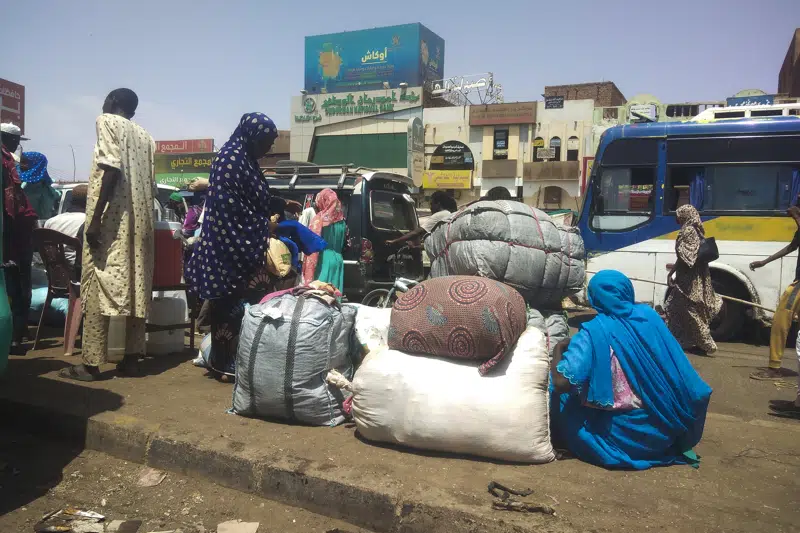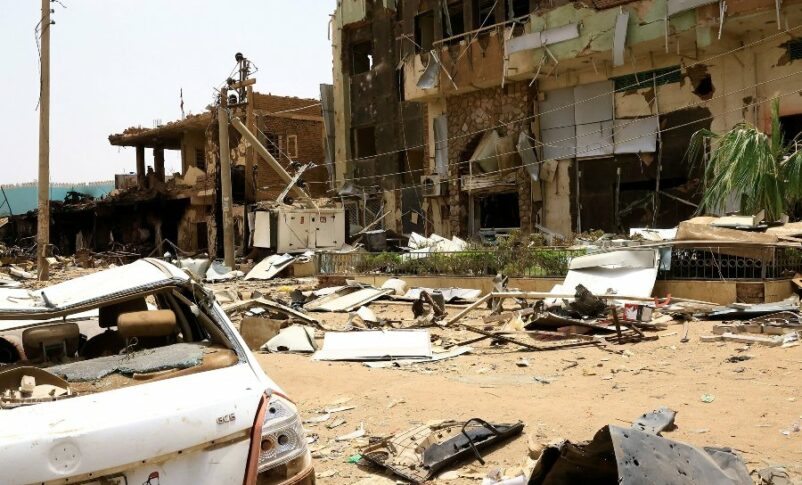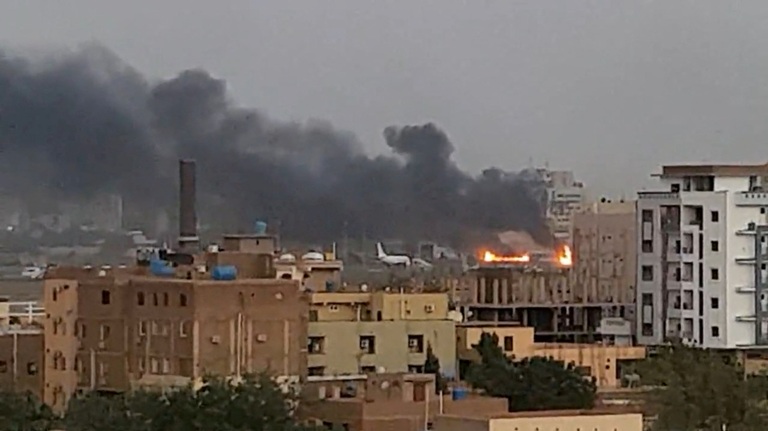African Union Advances Peace Plan for Sudan after the Failure of U.S.-Saudi Mediation
AFRICA, 12 Jun 2023
Abayomi Azikiwe – TRANSCEND Media Service
Fighting Reportedly Has Intensified after the Armed Forces Withdrew from Talks in Jeddah
6 Jun 2023 – An unstable humanitarian ceasefire agreement between the Sudanese Armed Forces (SAF) and the Rapid Support Forces (RSF) expired on June 4 after the collapse of negotiations in the Red Sea Kingdom of Saudi Arabia port city of Jeddah.
The aim of the accord was to allow the evacuation of those seeking medical attention and for the delivery of food and medical supplies.
In the midst of this impasse involving the forces loyal to General Abdel Fattah al-Burhan and his nemesis the militia leader General Mohamed Hamdan Degalo, the African Union (AU) held a meeting on June 1 aimed at restarting its process for stabilizing Sudan. The AU position provides a far more comprehensive roadmap not only to end the current security crisis the plan calls for the reimposition of an elected government.
Nevertheless, even during the April-May ceasefire periods, fighting continued in the capital of Khartoum where the RSF has reportedly taken over residential districts and public facilities. SAF fighter jets are carrying out aerial bombardments of areas inside the capital and its environs in attempts to flush out RSF units from the city.
Since April 15 when the fighting erupted, hundreds of people have been reportedly killed with thousands wounded. Approximately 2 million civilians both Sudanese nationals and refugees from neighboring states are displaced within and outside the Republic of Sudan. The refugees initially fled from instability in South Sudan, Ethiopia and other countries.
The humanitarian situation has reached critical proportions with the closure of most of the hospitals in Khartoum along with schools, businesses and diplomatic missions. Transportation hubs with buses and taxis are taking people away from the centers of the fighting in the capital and its twin city of Omdurman at great risk. With the failure of the Jeddah talks during early June, the AU and the other regional organizations in East Africa will inevitably become more aggressive in advancing their stabilization programs.
Underlying the failed talks in Jeddah are the factors related to the interference by the United States and Saudi Arabia in the internal affairs of the Republic of Sudan. In recent years since the removal of former President Omar Hassan al-Bashir by his military cohorts in efforts to halt a popular revolutionary movement from taking power in 2019, the U.S. State Department and the Saudi government rushed in to legitimize the military through financial assistance and promises of conditional large-scale loans from the International Monetary Fund (IMF) and the World Bank.
These U.S.-Saudi led efforts to reshape the political construct in Sudan during the last four years sought to overshadow the will of a substantial majority of the people inside the country. The military leadership began negotiations with the armed opposition groupings operating in Darfur and the border areas in the South. By October 2021, when the two military structures of the SAF and RSF overthrew the already fragile Sovereign Council headed by then interim Prime Minister Abdalla Hamdok, many of the armed opposition forces which had signed a ceasefire agreement with the government in Juba–capital of the Republic of South Sudan–sided with the Transitional Military Council which staged the coup.
The Forces for Freedom and Change (FFC), the Sudanese Professional Association (SPA), and other mass organizations, political parties and trade unions were disregarded in the process engineered by the U.S. The SAF has openly criticized the United Nations envoy to Sudan, Volker Perthes, saying that he is no longer welcome. Despite these difficulties, both sides in the current conflict will be compelled to reach an agreement since they cannot continue the fighting without external assistance.
Trilateral and Expanded Mechanisms for a Roadmap to Peace in Sudan
Over the last several months, the AU has advanced what is known as the Trilateral Mechanism involving the UN and the Inter-governmental Authority on Development (IGAD), a regional organization encompassing East African states. A June 1 meeting in Addis Ababa, Ethiopia at the headquarters of the AU represented the third meeting of an Expanded Mechanism seeking an end to the conflict and the beginning of a democratic transition.
Nonetheless, the U.S., Saudi Arabia, Britain and the United Arab Emirates (UAE) had established what is known as the “Quad.” Neither of these formations, the trilateral mechanism or the Quad, have been able to establish a firm ceasefire and a way forward in stabilizing the country under a democratic government.
According to a report from the AU on its June 1 session related to the security crisis in Sudan, it says:
“The Expanded Mechanism expressed concern at the continued fighting and stressed that there is no military solution to the conflict. The importance of a coordinated approach to resolving the crisis and the need for an African-led Sudanese-owned process was underlined. The participants cautioned against the proliferation of uncoordinated initiatives that would undermine the collective effort and the sovereignty of Sudan.
“The Expanded Mechanism welcomed the Jeddah Process facilitated by the Kingdom of Saudi Arabia and the United States of America, which resulted in the Declaration of Commitments and the Short-term Ceasefire and Humanitarian Arrangement and welcomed the five-day extension of the ceasefire announced on 29 May 2023. The Mechanism expressed concern at the lack of full implementation of the humanitarian ceasefire and the deteriorating humanitarian situation. In this regard, the Expanded Mechanism urged the parties to fully commit to undertaking their obligations to protect civilians and civil infrastructure and ensure the delivery of unhindered humanitarian assistance.”
Yet, the two military leaders seemed to be committed to the destruction of each other as a way of settling the crisis. Sudan as a state has been suspended from the AU due to a series of violent repressive campaigns by the security forces against the democratic movement. In the immediate future, it will be extremely difficult for either of the military structures to gain acceptance among the Sudanese people and the neighboring states.
Resistance Committees Call for Peace and a Democratic Transition
The Sudanese Resistance Committees which have been at the forefront of the democratic movement since December 2018, have condemned the actions of the RSF and the SAF. The Resistance Committees have been active since the current crisis which began on April 15.
They have been helping civilians seeking transport out of the severely impacted areas along with providing information to the population traumatized by the ongoing military confrontation between the two military structures. Amid the death, destruction and displacement among the population, the Resistance Committees have continued to call for the implementation of the aims of the Sudanese Revolution.
In a statement issued and signed by 42 mass organizations, professional groups and opposition political parties it emphasizes:
“In this regard, we intend to agree on a joint mechanism to monitor developments, coordinate positions, and confront anything that threatens the security and safety of our country and its citizens. The continuation of the war has left and still leaves catastrophic effects, as both parties did not abide by the ceasefire declared earlier by the United Nations. Safe corridors were not designated for evacuating the stranded, medical crews were not protected, hospitals were not spared, and we consider all these violations to be contrary to international humanitarian law and the Geneva Conventions. We hold the warring parties fully responsible for any violation of human rights.
“We renew the call for all civil revolution forces to take the initiative and unite to condemn the military operations, call for an immediate cessation of hostilities, and not leave the country as prey to the will of the military and remnants of the previous regime. We should mobilize to declare a comprehensive political strike and civil disobedience, which is the duty of the hour that we must all rally around, and not allow speeches of sedition, fragmentation, and hateful rhetoric to tear this country apart, and to undermine its unity, sovereignty, safety, and the dignity of its people.”
The way forward in Sudan to ensure peace and stability must be rooted in the empowerment of the people. Successive military-dominated governments have left the majority of Sudanese people unfulfilled in their political and socioeconomic desires for freedom and social justice. A country as wealthy and strategically located as the Republic of Sudan should be serving as a beacon of hope and prosperity for the entire Horn and East Africa region.
__________________________________________
Abayomi Azikiwe is the editor of Pan-African News Wire.
Tags: AU-African Union, Africa, Civil War, Conflict Mediation, Direct violence, South Sudan, Sudan, Violent conflict, Warfare
This article originally appeared on Transcend Media Service (TMS) on 12 Jun 2023.
Anticopyright: Editorials and articles originated on TMS may be freely reprinted, disseminated, translated and used as background material, provided an acknowledgement and link to the source, TMS: African Union Advances Peace Plan for Sudan after the Failure of U.S.-Saudi Mediation, is included. Thank you.
If you enjoyed this article, please donate to TMS to join the growing list of TMS Supporters.

This work is licensed under a CC BY-NC 4.0 License.



